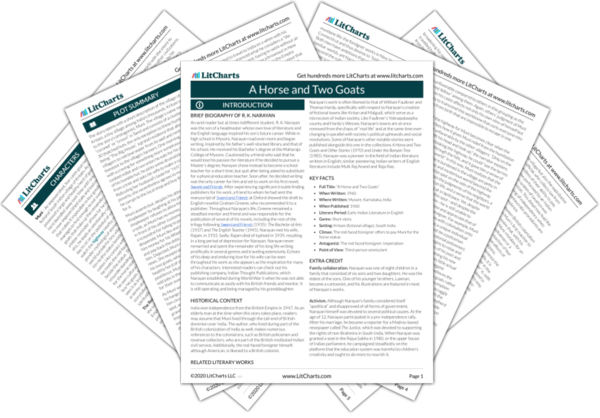Although women do not figure prominently in Narayan’s story, Muni’s relationship with his wife is the central pivot around which the author explores the issue of relationships between men and women. Although women in the story are clearly subordinate to men and men often engage in misogynistic commentary regarding the women in their lives, Narayan gives readers a subtle sense that, despite all this, women have more authority than is apparent at first glance. Narayan portrays a complex reality underneath the surface of his society’s patriarchal norms, suggesting that, regardless of the dictates of society, men and women forge their own relationships in accordance with their own personalities and priorities, and women, despite their subordinate status in society, nevertheless exercise power and authority.
The first meaningful interaction between Muni and his wife (who, perhaps reflecting her subordinate status in society, is not given a name in the story) occurs when Muni asks his wife to make a curry for him with the drumsticks (i.e., seed pods) he has picked from a tree outside their hut. Clearly, Muni’s wife oversees the domestic task of cooking in their household. When Muni returns from the local shop, dejected that he has not been able to buy the ingredients for the curry on credit, Muni’s wife seems to have expected as much. Muni orders her to sell the drumsticks to get money for their evening meal. In this way, he relies on his wife as a breadwinner of sorts, as he asks her to do the work that will ultimately put their dinner on the table.
Later in the story, Muni makes a reference to “thrash[ing his wife] only a few times in their career, and later she had the upper hand.” In other words, Muni hints that he has abused his power as a male to attempt to bend his wife to his will. However, this violent display of power and authority over his wife did not have the intended effect. Perhaps in part due to the couple’s childlessness and Muni’s gradual decline in prosperity and reputation, at some point Muni’s wife decided to work outside the home to ensure their survival. The fact that she earns her own money gives her some power over her husband as she now has economic means of her own—usually the preserve of men—and is thus able to draw attention to his dependence on her. Thus, regardless of the stringent patriarchal norms in India at this time, Muni’s wife and other low-caste women like her, who are more likely than upper-caste women to work outside the home, have a measure of power in society that they can use to their advantage. Additionally, the postman’s wife reminds readers that women are not entirely powerless and forced to tolerate their husbands indefinitely, as she presents the possibility of a woman running off with another man and choosing to live with him in the city.
While attempting to extract foodstuffs from the shopkeeper on credit, Muni makes a reference to a fictitious daughter who is going to send him money for his “fiftieth” birthday. As a childless man, one would expect Muni to fantasize about having sons, as the male sex is the preferred gender in societies where women are traditionally barred from obtaining independent economic means. Yet, Muni’s reference to his fictional daughter and her gift of money indicates that he is not the typical man who would wish for sons. Instead, he demonstrates a fondness for daughters as he describes “the thrill he had felt when he mentioned a daughter” and mentions that “his cousin in the next village had many daughters” and “he was fond of them all and would buy them sweets if he could afford it.” This thought indicates that, despite his outward displays of misogyny, Muni has not completely absorbed the patriarchal norms that dictate that a son has greater value than a daughter.
The patriarchal norms of the society Narayan describes cannot be taken at face value but must be explored with an eye for detail, as the social fabric is rich with nuance and power struggles between men and women. Although Muni had the “upper hand” at first in his marriage to his wife, his decline in fortunes and worsening reputation in the village most likely motivated his wife to seek work outside the home for survival, but not without the benefit of attaining independent economic means and a sense of empowerment and greater status when compared to her husband. In this way, Narayan delivers a nuanced and complex portrayal of relationships between men and women, in which the appearance of power does not necessarily equate with actual power.
Relations Between Men and Women ThemeTracker

Relations Between Men and Women Quotes in A Horse and Two Goats

Unlock explanations and citation info for this and every other A Horse and Two Goats quote.
Plus so much more...
Get LitCharts A+










